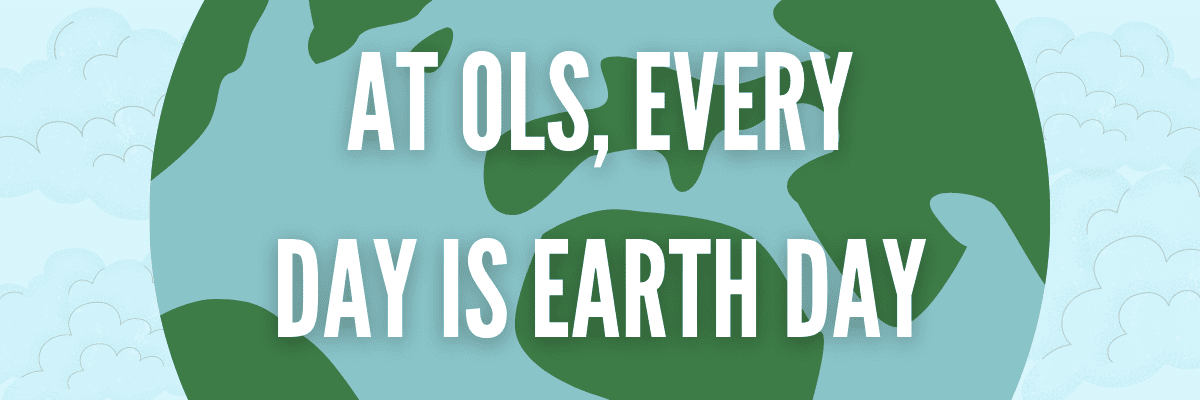The Earth is what we all have in common
-Wendell Berry, novelist
For the last 30 years, OLS has been a premier regional liquidator in the D.C.-area. What our older clients and associates might not know is that we now offer complete restoration of commercial spaces in order to meet clients’ lease-end obligations. On top of that, we have a dedication to protecting our planet. With liquidated assets, we sell, donate, and use waste-to-energy conversion in order to keep as much out of the landfill as possible.
When we started this business in the early ‘90s, we did not know that we would develop into an environmentally-based organization. Instead, we just knew we could take furniture no longer needed by our clients and sell it to other people who could use it. In 2010, when Scott Cornblatt purchased the company from his brother, OLS changed focus. We examined our responsibility to our clients, customers, planet, and community. Out of this, we adopted a triple bottom line: people, planet, and profit.
In keeping with our triple bottom line, we have decided that if we are going to be part of a project, we must add value to it. We have analyzed several years of historical projects to see where our strengths and weaknesses were. We looked at how we could use our creativity to get any job done sustainably and efficiently. From that data, we created more avenues of disposition. We built a national catalog of buyers and developed relationships with charitable organizations. When a project cannot be sold or donated, we now even try to give it away to a furniture dealer who may be able to resell or use the parts in their inventory. Anything to keep it out of a landfill.
When all else does not work and the furniture cannot be allocated elsewhere, we look to best practices of final disposition. First, we recycle anything we can. Then, we look for a waste-to-energy transfer station. Lastly, if we cannot find WTE, we will use a landfill, our least favorite way to handle the end of an asset’s life.
December 2020 marked 30 years for OLS in the furniture and liquidation business. In that time, we are proud to say that we have a strong history of exploring all avenues for reselling and reusing clients’ assets before final disposal. To date, we have created 3,485 project numbers, worked with 1,455 clients, and kept approximately 75% of the 225 million square feet of liquidated commercial space away from landfills.
2021 has continued this trend. Even in our current climate, we have been tasked with multiple exciting projects that focused on social and environmental sustainability. The first was for Marriott International. We are proud to have been able to facilitate the donation of 16 pallets of ceramic tiles and 6 pallets of ceiling tiles to Habitat for Humanity Metro Maryland in February and early March. Marriott’s donations will be used for two new construction homes, as well as to repair the homes of families living on fixed incomes. Donations like this help transform lives right here in our own community, one person at a time.
In March, OLS decommissioned, disconnected, and removed 5 large generators (weighing 35,000 lbs. ea.) from a building scheduled to be torn down in Northern Virginia. Their removal required the creativity and logistics OLS is known for. We found the most time and cost-effective form of removal. Then, the generators were sold for re-use and parts -- the highest form of recycling.
Kicking off April, we have conducted two incredibly successful online auctions. One was for the U.S. Building Green Council’s headquarters in Washington D.C., and it offered a wide variety of historical and modern pieces of furniture. The other was for Perspecta, who generously chose to donate the proceeds from their fitness room sale to benefit a local charity: Soldiers’ Angels Home of the Brave
Both companies felt strongly that OLS’s sales method was their best chance to reduce landfill use, increase asset reuse, and benefit our community.
Now that the spring is rolling in and we are squarely settled into the year, we can’t wait to see what new challenges and opportunities come our way, and how we can continue to creatively ensure the most landfill diversion and best outcome for our clients.
For those interested in learning more about their diversion options, here are a few points to remember:
- Gently used items are always salable, but you need to mentally prepare for the small fraction of the sticker price you will receive for it.
- Items that are broken and unusable can often be used for parts. Even office furniture!
- For items that are outdated or out of season, there many viable local organizations that could use them. Habitat for Humanity, local school systems, community centers, hospitals, and employment training centers are great places for office furniture and supplies.
Decrease your stress and your environmental footprint by going green with OLS! ♻️
Contact OLS today!
We will be happy to discuss our services and make an appointment to see your space and products. Fill out a simple form or give us a call at 301.296.3100.


